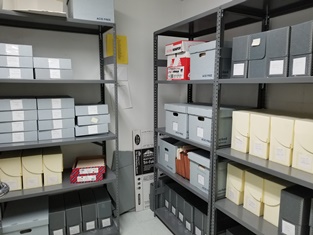Our UUCWC archives is vitally important to our church because we have such a rich history. Started by Jane Shafer in the mid-1990s when she took over a second floor closet, the archives has expanded and become more organized over the years. The organization plan in the early days involved pulling all the boxes out into a classroom over the summer so volunteers could sift through our history and paperwork. When Jane needed to take a step back from the job in 2013, the board appointed Charlie Groth as the archivist. Upon hearing about Charlie’s new post, I jumped at the chance to help her because I saw it as an opportunity to use my professional archival training and beef up my resume.
When Charlie and I began our work back in 2013, we realized that our schedules and different way of organizing would change how things worked in our archives closet. Instead of spending full days in the summer, Charlie and I initiated a plan to work a couple of hours per week year-round. We visited other church archives to find out how they did things, pulled out our organizational and archival skills, and started making progress breaking down masses of paperwork, photos, and recordings into specific categories.
These changes in the archives has allowed for our church history to be used regularly for displays, written articles, presentations, and for committee or personal research. Our team works to help people find the information or photographs they are looking for and fill in the blanks of why, who, what, and when in UUCWC’s past. Some volunteers, such as Betsy Young and Ronnie Dobrowolski, can easily identify members in photos from decades before, while younger volunteers enjoy seeing how things have changed and get a thrill when they see a familiar name.
 We have been very lucky over the years to have received two grants from the Endowment Committee to help pay for supplies and storage for our work. Many of our first archival supplies came from a 2014 grant, perfectly timed to be used for the new staff and new organizational strategies. Our most recent grant in 2018 helped expand our abilities to work with digital storage and oral history recordings, as well as maximize the archival storage in our closet. The most recent big change in the archives was achieved when George Faulkner and Steve Saddlemire put together sturdy metal shelving to house our archives boxes.
We have been very lucky over the years to have received two grants from the Endowment Committee to help pay for supplies and storage for our work. Many of our first archival supplies came from a 2014 grant, perfectly timed to be used for the new staff and new organizational strategies. Our most recent grant in 2018 helped expand our abilities to work with digital storage and oral history recordings, as well as maximize the archival storage in our closet. The most recent big change in the archives was achieved when George Faulkner and Steve Saddlemire put together sturdy metal shelving to house our archives boxes.
Creating and maintaining an archives is truly a job that will never be over. It is amazing to see how on-going volunteer work can change the accessibility to our history and understanding. I want to thank the people and committees that have gotten involved and encourage others to join in volunteering or take advantage of our resources. More challenges are on the horizon, but we should all be proud of how far we have come.
